
News
Behind the Headlines
Two-Cents Worth
Video of the Week
News Blurbs
Articles
Testimony
Bible Questions
Internet Articles (2015)
Internet Articles (2014)
Internet
Articles (2013)
Internet Articles (2012)
Internet Articles (2011)
Internet Articles (2010)
Internet Articles
(2009)
Internet Articles (2008)
Internet Articles (2007)
Internet Articles (2006)
Internet Articles (2005)
Internet Articles (2004)
Internet Articles (2003)
Internet Articles (2002)
Internet Articles (2001)

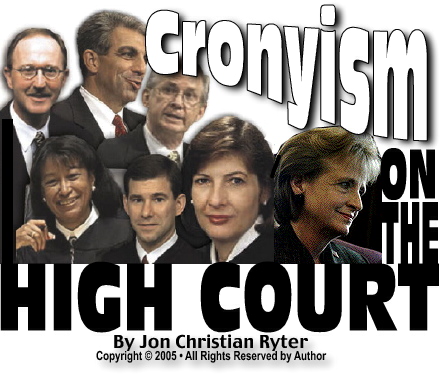
![]() here
is a historic precedent in American president's appointing friends,
allies and minions to berths on the US Supreme Court. The practice is
as old as the presidency itself. John Jay, whom George Washington
picked as the first Chief Justice of the Supreme Court, John Rutledge,
Robert Harrison, William Paterson (who was picked by Washington
to replace Thomas Johnson who replaced Rutledge when he
quit in 1791 to become Chief Justice of the South Carolina Supreme Court),
and James Wilson were all closely connected to Washington
in different ways during the Revolutionary War.
here
is a historic precedent in American president's appointing friends,
allies and minions to berths on the US Supreme Court. The practice is
as old as the presidency itself. John Jay, whom George Washington
picked as the first Chief Justice of the Supreme Court, John Rutledge,
Robert Harrison, William Paterson (who was picked by Washington
to replace Thomas Johnson who replaced Rutledge when he
quit in 1791 to become Chief Justice of the South Carolina Supreme Court),
and James Wilson were all closely connected to Washington
in different ways during the Revolutionary War. 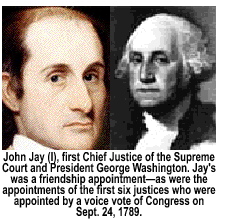 Out
of the eleven jurists Washington named to the Supreme Court during
his 8-years as President, six served with him in some capacity during
the Revolutionary War. Washington picked them not because they
were "experienced" jurists or had a vast amount of knowledge
about the recently ratified Constitution. Washington picked them
because he knew them and because all of them were politically and philosophically
Federalists. When John Jay resigned from the high court in 1795
to run for governor of New York, Washington made the first "recess
appointment," installing his friend John Rutledge as Chief
Justice. The Senate, however, rejected Rutledge because the militant
jurist had spoke out against Jay's Treaty and because when Rutledge's
wife died he fell to pieces and spent time in an insane asylum.
Out
of the eleven jurists Washington named to the Supreme Court during
his 8-years as President, six served with him in some capacity during
the Revolutionary War. Washington picked them not because they
were "experienced" jurists or had a vast amount of knowledge
about the recently ratified Constitution. Washington picked them
because he knew them and because all of them were politically and philosophically
Federalists. When John Jay resigned from the high court in 1795
to run for governor of New York, Washington made the first "recess
appointment," installing his friend John Rutledge as Chief
Justice. The Senate, however, rejected Rutledge because the militant
jurist had spoke out against Jay's Treaty and because when Rutledge's
wife died he fell to pieces and spent time in an insane asylum.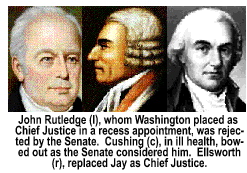 Washington appointed another cohort, William Cushing who
served as the Vice President of the Constitutional Convention to replace
Jay. Because his health was poor, Cushing reconsidered
his nomination and declined the post. Ultimately Washington selected
a candidate based on his constitutional qualifications—the yardstick
by which candidates were measured until Abraham Lincoln picked
Salmon Portland Chase to replace Roger Taney as Chief
Justice on Dec. 6, 1864. Washington selected Oliver Ellsworth
as the second Chief Justice. Ellsworth was one of the five men
who drafted the Constitution. He was, without a doubt, the most qualified
man in history to lead the high court.
Washington appointed another cohort, William Cushing who
served as the Vice President of the Constitutional Convention to replace
Jay. Because his health was poor, Cushing reconsidered
his nomination and declined the post. Ultimately Washington selected
a candidate based on his constitutional qualifications—the yardstick
by which candidates were measured until Abraham Lincoln picked
Salmon Portland Chase to replace Roger Taney as Chief
Justice on Dec. 6, 1864. Washington selected Oliver Ellsworth
as the second Chief Justice. Ellsworth was one of the five men
who drafted the Constitution. He was, without a doubt, the most qualified
man in history to lead the high court.
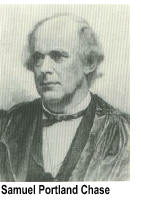 Salmon
Portland Chase was the least qualified person to sit on the high
court until President George W. Bush nominated his legal adviser,
Harriet Miers to replace Associate Justice Sandra Day O'Connor
on October 7, 2005.
Salmon
Portland Chase was the least qualified person to sit on the high
court until President George W. Bush nominated his legal adviser,
Harriet Miers to replace Associate Justice Sandra Day O'Connor
on October 7, 2005.
Chase's nomination was purely political. The Jacobins who controlled the Republican Party wanted Chase—a former Ohio governor, banker, and head of the Free Soil Party (that merged with the Whigs and the anti-Masons to became the Republican Party)—to lead the court in order to reshape the nation during Reconstruction. Chase's mission was to deflect legal challenges from the States when a permanent central bank was legislated. Lincoln hated Chase, but appointed his former Treasury Secretary as Chief Justice because he was pressured to do so by the Jacobins. Chase was confirmed by a voice vote. Not even the Senate Jacobins who shouted "yea" wanted their names attached to that confirmation.
Five years later Ulysses S. Grant appointed
former Secretary of War Edwin Stanton—another Jacobin—to
the high court. Stanton, like Chase before him, was a
crony appointment. Stanton was confirmed on a 46 to 11 vote on
Dec. 20, 1869. He died before he could be seated on the high court.
 Stanton
should never have been nominated since he was implicated by Col.
Lafayette C. Baker (who headed the presidential protection detail
in the newly formed Secret Service) in the plot to assassinate Abraham
Lincoln.
Stanton
should never have been nominated since he was implicated by Col.
Lafayette C. Baker (who headed the presidential protection detail
in the newly formed Secret Service) in the plot to assassinate Abraham
Lincoln.
In his deathbed confession, Baker implicated Stanton, 11 members of the Jacobin Congress, 12 US Army officers, 3 US Navy officers and 24 civilians. Five of the civilians were extremely influential bankers, 11 were industrialists of "...great repute and wealth." After several unsuccessful attempts by the conspirators to assassinate Baker in order to prevent him from incriminating them, he was poisoned on Jan. 12, 1868. Baker finally died on June 3, 1868. His doctor claimed he died of typhoid fever and sealed his coffin. His body was never examined. Baker's confession—and his accusation—which has also never been examined, remains in the National Archive.
History is replete with
instances of cronyism in the appointment of Supreme Court Justices.
The appointments of Chase and Stanton were among the worst
in the 19th century. The appointment of Abe Fortas by Lyndon
B. Johnson ranks as the worst in the 20th century. But the president
who fine-tuned the art using cronyism to select nominees for the high
court was Franklin D. Roosevelt. 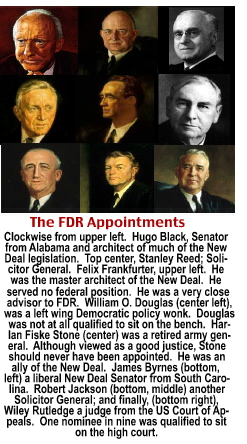 Only
Washington placed more judges on the Supreme Court than Roosevelt.
After Roosevelt attempted to add additional justices on the Supreme
Court so he could control how the high court's rulings impacted the
New Deal that was currently being overruled on Constitutional grounds
by the Hughes Court, he managed to entice Associate Justices
Willis Van Devanter and George Sutherland to retire by
getting Congress to pass a law allowing federal judges to retire at
age 70 with 100% of the income they earned as jurists. In six years,
two thirds of the high court retired or died, giving FDR a bonanza
of vacancies for him to fill.
Only
Washington placed more judges on the Supreme Court than Roosevelt.
After Roosevelt attempted to add additional justices on the Supreme
Court so he could control how the high court's rulings impacted the
New Deal that was currently being overruled on Constitutional grounds
by the Hughes Court, he managed to entice Associate Justices
Willis Van Devanter and George Sutherland to retire by
getting Congress to pass a law allowing federal judges to retire at
age 70 with 100% of the income they earned as jurists. In six years,
two thirds of the high court retired or died, giving FDR a bonanza
of vacancies for him to fill.
FDR's appointments to the high court were all made with one core objective in mind: finding men who would agree to protect the New Deal laws even though almost all of them violated the Constitutional separation of powers, or the Bill of Rights.
FDR appointed cronies, minions and party hacks. If Roosevelt had not had an overwhelming majority of New Dealers in the House and Senate from 1937 to 1943, he would never have gotten Hugo Black, Stanley Reed, Felix Frankfurter, James Byrnes, William O. Douglas and Harlan Stone through the vetting process. Black, Frankfurter and Byrnes engineered most of the New Deal. It was clear that all of FDR's choices were being placed on the high court solely to protect the New Deal laws at all costs.
America—and the US Senate—believed Roosevelt when he said he knew he character of the unqualified men with no judicial record he was nominating to the high court. In truth, FDR did know the character of those he appointed. That's why he appointed them. They were lackeys to his socialist "New Deal agenda." The New Deal, like the "greater democracy" of Lyndon B. Johnson's Great Society, was an attempt by the political left to break the spine of the Constitution, dilute the liberties provided to Americans into conditional rights that can be granted or retracted by the government, and convert the American Republic into a socialist democracy. Unfortunately for America in 1937 the American people, who were still largely political novices, believed their national leaders would do them no harm.
America believed Roosevelt
when he assured the public that those he nominated would be stalwart
protectors of the Constitution and the Bill of Rights. Yet, at their
hands, the worst deconstructions of liberty occurred as the Hughes
Court, fearing that FDR's next attempt to stack the high
court would succeed began to legislate from the bench. 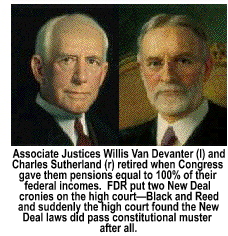 The
high court, even before Van Devanter and Sutherland retired,
had been politicized by FDR. FDR's cronies found easy
confirmations in the New Deal Senate. Once confirmed, they went back
and redressed several of the New Deal laws that had previously been
overturned as unconstitutional. One-by-one, the New Deal Court decided
that, due to the ongoing national emergency that was triggered by the
Depression of 1929 a decade earlier, Congress and FDR'S Solicitor
General insisted it was justified in blurring the separation of powers
and granting the president extraordinary power he did not constitutionally
possess. Even though the national emergency brought on by the Depression
of 1929 has long since vanished, all presidents still retain those unconstitutional
powers even though Congress theoretically limited those powers with
the National Emergencies Act that was signed into law by President
Gerald Ford in 1976.
The
high court, even before Van Devanter and Sutherland retired,
had been politicized by FDR. FDR's cronies found easy
confirmations in the New Deal Senate. Once confirmed, they went back
and redressed several of the New Deal laws that had previously been
overturned as unconstitutional. One-by-one, the New Deal Court decided
that, due to the ongoing national emergency that was triggered by the
Depression of 1929 a decade earlier, Congress and FDR'S Solicitor
General insisted it was justified in blurring the separation of powers
and granting the president extraordinary power he did not constitutionally
possess. Even though the national emergency brought on by the Depression
of 1929 has long since vanished, all presidents still retain those unconstitutional
powers even though Congress theoretically limited those powers with
the National Emergencies Act that was signed into law by President
Gerald Ford in 1976.
While his attempt to convert the high court into an instrument of the White House failed in 1937, Roosevelt nevertheless succeeded in protecting the New Deal, which is all he wanted. The ideologues behind both major parties realized that by controlling the philosophical slant of the high court, it was possible not only to safeguard prior judicial decisions, protect unconstitutional legislation that Congress wants implemented, but it also opened the door for the courts to "clarify" vague statutes in those laws in order to dispense equality through social justice that could not have been successfully legislated by Congress without voter backlash. That is what happens on the high court when presidents are allowed to install cronies or otherwise constitutionally unqualified people—many of whom are not even jurists—on the bench.
Presidents and Congress since the end of World War I when Woodrow Wilson tried to surrender the sovereignty of the United States to the European globalists through the League of Nations, have been trying to deconstruct the Constitution of the United States in order to abrogate the inherent rights of the American people—and the ability of the people to control the elected elite. Try as they have with both the League of Nations and the United Nations, the globalists have failed to abrogate sovereignty to the supra-government of the UN, its central bank—the World Bank—and the International Criminal Court, the enforcement arm of the World Court in the Hague. Yet, by placing unqualified surrogates of globalism on the high court, the transnational industrialists and bankers who finance the political campaigns of tenured Congressman and Senator to gain their votes on these "important" bedrock issues, have been able to nibble away at the edges of the Constitution for decades until it no longer resembles the document for which thousands of Americans shed their blood to protect.
The advise and consent provision in Article II, Section 2—inserted to make sure that cronyism was never a criteria for federal appointments—has devolved into ideological war games since the senatorial privilege of "advise and consent" is now used to deny presidents the confirmations of strict rule-of-law jurists to the federal bench because socialism—even in a democracy—calls for "rule by and for the minority," not "rule by the majority." Social justice argues that while all men are created equal, some are a little more equal than others.
.jpg) Socialism
began to creep into the high court with the appointment of Felix
Frankfurter—one of the founding attorneys of the American
Civil Liberties Union. The first communist appointed to the high
court was Abe Fortas. His appointment was a "crony"
appointment by Lyndon B. Johnson.
Socialism
began to creep into the high court with the appointment of Felix
Frankfurter—one of the founding attorneys of the American
Civil Liberties Union. The first communist appointed to the high
court was Abe Fortas. His appointment was a "crony"
appointment by Lyndon B. Johnson.
Had Fortas been
properly vetted, he would never have been nominated for a slot on the
high court. Fortas was a close, personal friend and political
ally of LBJ. .jpg) Their
friendship dated back to the mid-1940s when Fortas was, first,
an Undersecretary of the Department of the Interior and later, General
Counsel to the FEA in the Roosevelt Administration. (Fortas
was outed by Gestapo chieftain Henrich Muller at the end of World
War II when Muller began providing the American government with
top secret Nazi information on Soviet moles in the Roosevelt Administration.
Fortas was on a list of 87 names that included other notable
FDR aides such as Harold Ickes, Frances Perkins,
Adolph Berle, Jr.. Harry Dexter White and Alger Hiss,
as agents of the Soviet Union. Muller could not identify which
were paid agents and which were merely ideological soulmates. But all
of them had provided a steady stream of data to the Soviets during the
war. Hitler's Gestapo had successfully tapped most of
the private phones of the world's leaders. In 1939, German scientist
Dr. Wilhelm Obnesorge cracked the code of the AT&T A-3 scrambler,
and the Gestapo was able to monitor the "secure" telephone
calls made from any telephone on Capitol Hill in Washington or from
10 Downing Street in London as well as most of the homes of the other
world leaders if Berlin viewed them as a threat to the Third Reich.)
Unfortunately for the American people, the Truman Administration
didn't care. While Truman didn't want the pro-Soviet FDR
aides in his administration, he was not eager to expose them either
since, with Roosevelt dead, they were his problem and the buck did
stop at his desk.
Their
friendship dated back to the mid-1940s when Fortas was, first,
an Undersecretary of the Department of the Interior and later, General
Counsel to the FEA in the Roosevelt Administration. (Fortas
was outed by Gestapo chieftain Henrich Muller at the end of World
War II when Muller began providing the American government with
top secret Nazi information on Soviet moles in the Roosevelt Administration.
Fortas was on a list of 87 names that included other notable
FDR aides such as Harold Ickes, Frances Perkins,
Adolph Berle, Jr.. Harry Dexter White and Alger Hiss,
as agents of the Soviet Union. Muller could not identify which
were paid agents and which were merely ideological soulmates. But all
of them had provided a steady stream of data to the Soviets during the
war. Hitler's Gestapo had successfully tapped most of
the private phones of the world's leaders. In 1939, German scientist
Dr. Wilhelm Obnesorge cracked the code of the AT&T A-3 scrambler,
and the Gestapo was able to monitor the "secure" telephone
calls made from any telephone on Capitol Hill in Washington or from
10 Downing Street in London as well as most of the homes of the other
world leaders if Berlin viewed them as a threat to the Third Reich.)
Unfortunately for the American people, the Truman Administration
didn't care. While Truman didn't want the pro-Soviet FDR
aides in his administration, he was not eager to expose them either
since, with Roosevelt dead, they were his problem and the buck did
stop at his desk.
Congressman Lyndon B.
Johnson decided to run for the US Senate in 1948. His main opposition
in the Democratic primary was Coke Stevenson. (Texas was virtually
a one party State in the 1940s-1950s. If you won the Democratic primary,
you had already won the general election.) Johnson won the primary
by 87 votes. Stevenson accused LBJ of ballot-rigging and
substantiated his allegations well enough to secure an injunction to
keep Johnson's name off the November ballot. Johnson called
Fortas and asked him to intercede by calling Associate Justice
Arthur Goldberg to squash the injunction. Fortas did.
The injunction was suspended and Johnson was elected. But because
a cloud still hung over the question of ballot-rigging, LBJ was
barred from taking his seat. .jpg) Fortas
arranged for an investigation by his friend J. Edgar Hoover who
found no evidence that Johnson had engaged in voting the dead.
LBJ was seated and the rest, as they say, is history.
Fortas
arranged for an investigation by his friend J. Edgar Hoover who
found no evidence that Johnson had engaged in voting the dead.
LBJ was seated and the rest, as they say, is history.
On Nov. 22, 1963 the US
Senate Rules Committee chaired by B. Everett Jordan [D-NC] was
investigating the Vice President of the United States in a secret session
brought about by Attorney General Robert Kennedy's own investigation
of Bobby Baker after Kennedy discovered links between
Baker and several Mafia bosses. Kennedy suspected the ties went
all the way to Johnson.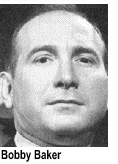 The Rules Committee, however, did not know that as they were
listening to testimony from insurance executive Don B. Reynolds,
the nation was mourning the loss of John F. Kennedy who had just
been shot. Because Jordon sealed the hearing, no one on the Senate
Rules Committee was allowed to leave the room, and no one was allowed
to enter. There were no phones in the room,so no one knew that JFK
had been killed. Nor did they know that man they were investigating
had just become the President of the United States.
The Rules Committee, however, did not know that as they were
listening to testimony from insurance executive Don B. Reynolds,
the nation was mourning the loss of John F. Kennedy who had just
been shot. Because Jordon sealed the hearing, no one on the Senate
Rules Committee was allowed to leave the room, and no one was allowed
to enter. There were no phones in the room,so no one knew that JFK
had been killed. Nor did they know that man they were investigating
had just become the President of the United States.
Reynolds testified
that he asked Baker—a personal friend—to arrange for
his boss—LBJ—to buy a life insurance policy from him.
Johnson agreed providing .jpg) Reynolds
give him a $585 Magnavox Stereo and that his agency buy $1,200 in advertising
on KTFX (Ladybird Johnson's radio station). The information Jordan
was really after, however, was not about the petty insurance kickback.
Jordan was after bigger fish that day. The insurance kickback
question was asked to put Reynolds at ease so he could drop the
bomb that should have forced LBJ to resign the vice presidency.
History sometimes has a way of upsetting the best laid traps of man—and
November 22, 1963 was one of those days.
Reynolds
give him a $585 Magnavox Stereo and that his agency buy $1,200 in advertising
on KTFX (Ladybird Johnson's radio station). The information Jordan
was really after, however, was not about the petty insurance kickback.
Jordan was after bigger fish that day. The insurance kickback
question was asked to put Reynolds at ease so he could drop the
bomb that should have forced LBJ to resign the vice presidency.
History sometimes has a way of upsetting the best laid traps of man—and
November 22, 1963 was one of those days.
Reynolds told the committee that he personally saw Bobby Baker give Johnson a suiticase containing what he was told was $100 thousand. The kickback, he said, was for LBJ helping Baker with a lucrative deal in Fort Worth. Reynolds then revealed that i n 1950 Johnson and Baker purportedly helped Intercontinental Hotels Corporation get some casino licenses in the Dominican Republic.
Involved in this Baker-Johnson deal was Ed Levesen, Meyer Lansky and Mafia boss Sam Giancana. When the casinos opened their doors in 1955, Johnson and Baker were invited as official guests of the syndicate. According to testimony, Baker suggested that the mob think about using the Domincan Republic as a Mafia replacement for Cuba which became off-limits to Americans after the Bay of Pigs. In 1962, Baker—still serving as Johnson's chief-of-staff—formed Serv-U Corporation with Levenson. Serv-U provided vending machines to companies working under federal grants. The vending machines were manufactured by a company owned by Giancana in Chicago. Companies receiving "free money" from Uncle Sam were made to feel obligated to use vending machine companies recommended by the Vice President of the United States..
Had Kennedy not been assassinated that day, it is very likely that Johnson would have been forced to follow Schulyer Colfax—Grant's vice president—as the second veep to resign from office under a cloud. Instead, Spiro Agnew, Nixon's vice president became that person. The Senate Rules Committee was sitting on enough information that, had it all leaked out, Lyndon Johnson would have been the first president removed from office by impeachment. On December 6, 1963, LBJ called Jordan and applied just enough presidential pressure on him to force the Senator to "lose" the Reynolds testimony—or at least bury it deep enough to to keep the information from getting into the hands of the media—for a while. Jordan assured Johnson he would do what he could to supress the information because he said "...it might spread [to] places we don't want it to spread."
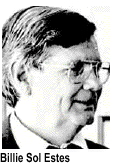 Once
again LBJ was forced to call Fortas, the fireman to put
out the latest fire before it ignited in the West Wing of the White
House. Fortas, who represented both Johnson and financier
Bobby Baker—and, later, Billie Sol Estes who was
leasing nonexistent grain silos to the Johnson Agriculture Department
for a tidy sum each year—worked completely behind the scenes
to help Johnson orchestrate a smear campaign against Reynolds
in order to discredit his testimony. To help his new boss, and guarantee
he could not be fired by LBJ, FBI Director Hoover gave
the White House Reynolds' FBI file.
Once
again LBJ was forced to call Fortas, the fireman to put
out the latest fire before it ignited in the West Wing of the White
House. Fortas, who represented both Johnson and financier
Bobby Baker—and, later, Billie Sol Estes who was
leasing nonexistent grain silos to the Johnson Agriculture Department
for a tidy sum each year—worked completely behind the scenes
to help Johnson orchestrate a smear campaign against Reynolds
in order to discredit his testimony. To help his new boss, and guarantee
he could not be fired by LBJ, FBI Director Hoover gave
the White House Reynolds' FBI file.
Johnson leaked information from the Reynolds' file to Drew Pearson and Jack Anderson on Jan. 17, 1964. Leaked were claims that Reynolds had lied about his academic success at West Point, that he had been a supporter of Sen. Joe McCarthy and that, as such, he falsely accused business rivals of being communists. And finally, in 1953, Reynolds purportedly made an off-color anti-semitic remark while he was in Berlin. While Reynolds' transgressions were nothing like Lewinsky's blue dress, they were sufficient to make Reynolds look like soiled goods. He was discredited sufficiently to make it appear that his testimony was tainted.
A few weeks later the New York Times reported that LBJ had provided the information to Pearson and Anderson—and also that Johnson, as President of the United States, used his high office to pressure newspaper publishers not to print any of the information that had been disclosed about him by Reynolds to the Senate Rules Committee. Most did not. Only the foolhardy and the brave—and those large enough to survive a broadside by the White House—did.
On July 28, 1965 Lyndon B. Johnson nominated his good friend and fellow conspirator Abraham Fortas to replace Abe's friend, Associate Justice Arthur Goldberg, on the Supreme Court.
The apple does not fall
far from the tree.
Fortas was carrying as much baggage as LBJ. Only, Fortas'
indiscretions did not surface until Johnson nominated him to
replace Earl Warren as Chief Justice. Only Fortas did
not have a friend as well connected as himself to conceal his wrongdoings.
Two scandals broke that sealed Fortas' fate on the high court.
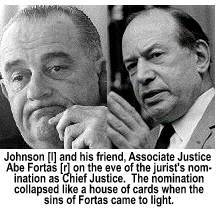 First,
when LBJ nominated him to replace Warren as chief justice,
the first shoe dropped. As a sitting justice on the high court, the
Senate Judiciary Committe learned that Fortas regularly attended
White House staff meetings and briefed Johnson on the secret
deliberations of the high court as it was contemplating its verdicts.
On behalf of Johnson, Fortas lobbied Congress for favorable
votes on Vietnam. But, worse, the Senate learned, as an Associate Justice,
Fortas was being paid a stipend equal to 40% of his wages as
a jurist to teach a summer class each year at American University
in Washington, DC. Without even considering the fact that Fortas
was a card-carrying communist, that information triggered the first
filibuster ever of a Supreme Court nominee—and the real damning
information had not yet been made public. Wall Street financier Louis
Wolfson, another friend of Fortas, was indicted for stock
fraud—selling unregistered stocks to the public—and of perjury.
The second shoe dropped.
First,
when LBJ nominated him to replace Warren as chief justice,
the first shoe dropped. As a sitting justice on the high court, the
Senate Judiciary Committe learned that Fortas regularly attended
White House staff meetings and briefed Johnson on the secret
deliberations of the high court as it was contemplating its verdicts.
On behalf of Johnson, Fortas lobbied Congress for favorable
votes on Vietnam. But, worse, the Senate learned, as an Associate Justice,
Fortas was being paid a stipend equal to 40% of his wages as
a jurist to teach a summer class each year at American University
in Washington, DC. Without even considering the fact that Fortas
was a card-carrying communist, that information triggered the first
filibuster ever of a Supreme Court nominee—and the real damning
information had not yet been made public. Wall Street financier Louis
Wolfson, another friend of Fortas, was indicted for stock
fraud—selling unregistered stocks to the public—and of perjury.
The second shoe dropped.
Wolfson was convicted and served one year at a federal lockup at Elgin AFB. In addition, he paid a substantial fine. Wolfson appealed his conviction to the US Supreme Court. The high court, however, declined to accept the appeal. During the vetting process of Fortas' nomination as Chief Justice it was discovered that one of Wolfson's charitable foundations paid Fortas $20,000 shortly after the financier's initial conviction. The Senate Judiciary Committee viewed the payment as a bribe for Abe's "handling" of the other justices to make Wolfson's conviction go away.
Fortas was forced to resign from the Supreme Couart to aviod impeachment. He was replaced by Harry Blackmun on May 12, 1970. Johnson vouched for Fortas' lack of judicial experience when he nominated him. What else could he say? What else can George W. Bush say about Harriet Miers? "She's rather mediocre and has a boring resume, but she's been a very loyal trooper and she assures me she will vote in a way that will please me, so I'm rewarding her with one of the nine of the most powerful appointed jobs in America." That's cronyism, pure and simple. It was not enough for Bush to give her a seat on a District Court—still a lifetime berth. Bush wants to reward Miers with a job that will allow her to be one of nine people with the power to change the face of America.
What Bush did say was: "People are interested to know why I picked Harriet Myers. They want to know Harriet Miers' background." Actually, people aren't as interested in her background as they are her qualifications. They want to be assured that the President actually had a reason for nominating her other than cronyism. "[People] want to know as much as they possibly can before they form opinions. Part of Harriet Miers' life is her religion." Frankly, if that's the best Bush can offer—when religion is the taboo smart politicians dance away from when talking about nominees they are about to put on the bench for life—he needs to find another person for the job because she is not qualified. Christian conservatives want to know there is any genuine substance to the President's nominees outside of the pew "photo ops" that politicians fall back on when every else fails or they have nothing else redeemable to offer.
Bush is throwing Mier's evangelical born-again experience against the wall, hoping it will stick. Bush is hoping this will cause the conservative right to support his choice even though she is insupportable. Religion was an area the White House carefully avoided when Chief Justice John Roberts was being vetted by the Senate Judiciary Committee. Why? Because [a] Roberts is devout Catholic [as opposed to being simply a mainstream Protestant, and [b] the White House tried hard to play down Roberts' Christian conservatism because it would detract from his stellar constitutional pedigree. Miers, on the other hand, has no pedigree. She's a Heinz 57 variety candidate—and none of the 57 varieties rise to level we have come to expect in judicial nominees. None. Zip. Zilch. Nada.
Evangelical support for Miers is tissue thin compared to Roberts. Which is why Bush is trying so hard to make the case for Miers as an evangelical. The Christian base that elected Bush in 2004 will likely not come out to play in November, 2006 unless Bush can prove he did not deal them one from the bottom of the deck. Bush's problem is that instead of asking for a new deck and dealing a new hand, he is trying to reshuffle the old deck in order to make an Old Maid look like a Royal Flush. It isn't going to happen even though he might be able to twist arms the way FDR twisted arms to get his New Deal justices confirmed, or the way LBJ twisted arms to get Abe Fortas confirmed.
"The White House and the religious right rallying around the beleaguered nomination of Harriet Miers," People for the American Way director Ralph Gneiss chided, "continue to cite her religious beliefs and the church she attends as reasons to believe she will oppose abortion rights, and to bolster support for her among activists on the far right. What's wrong for John Roberts can't be right for Harriet Miers." The difference is, Roberts is the real McCoy. Miers is not. What's more, the left knows it—and Bush knows they know it. That's why he's not afraid to throw out the religion card. The left knows that card is a joker.
When you're looking at Miers, this is what you see. [1] She's a 60-ish Old Maid with absolutely no job experience for the position she is seeking. [2] Her resume pales compared to those Bush's conservative base expected the president to pick from. [3] She is a Bush crony—like Mike Brown and Julia Myers.
Only minutes after Bush announced Mier's nomination on Oct. 3, Manuel Miranda, a former aide to Senate Majority leader Bill Frist, and a conservative strategist, said: "The reaction of many conservatives today will be that the president has made possibly the most unqualified choice since Abe Fortas, who had been the president's lawyer. The nomination of a nominee with no judicial record is a significant failure for the advisers that the White House gathered around it." Miranda added that Miers is a Bush crony who leapfrogged ahead of far more qualified judges simply because she was Bush's pal.
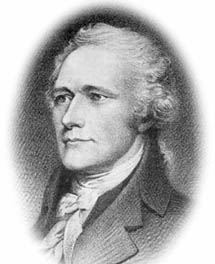 In
the final analysis, probably no one said it better than Alexander
Hamilton in the Federalist Papers, #76. "To what
purpose then require the cooperation of the Senate? ...It would be an
excellent check upon the spirit of favoritism in the President, and
would tend greatly to prevent the appointment of unfit characters from
State prejudice, from family connection, from personal attachment, or
from a view to popularity...He would be both ashamed and afraid to
bring forward, for the most distinguished or lucrative stations, candidates
who had no other merit than that of coming from the same State to which
he particularly belonged, or of being in some way or other personally
allied to him..."
In
the final analysis, probably no one said it better than Alexander
Hamilton in the Federalist Papers, #76. "To what
purpose then require the cooperation of the Senate? ...It would be an
excellent check upon the spirit of favoritism in the President, and
would tend greatly to prevent the appointment of unfit characters from
State prejudice, from family connection, from personal attachment, or
from a view to popularity...He would be both ashamed and afraid to
bring forward, for the most distinguished or lucrative stations, candidates
who had no other merit than that of coming from the same State to which
he particularly belonged, or of being in some way or other personally
allied to him..."
That, in a nutshell, is an accurate synopsis of the Miers nomination. She has no judicial record, and no experience that qualifies her to judge constitutional issues. She has no merit other than she comes from Texas, and she is personally allied with Bush. As we can see from Abe Fortas' ties with Lyndon B. Johnson or the justices named by Franklin D. Roosevelt to protect the New Deal laws that created the unconstitutional fourth branch of government—the bureaucracy, when you put unqualified people on the high court, you are forced to live with the monster you create.
Roosevelt's monster all but destroyed the Bill of Rights. The new monster has an agenda, too. The Miers agenda will be to help the globalists on the Supreme Court codify the laws of the European Union and the World Court into US case law, and to judicially erase national sovereignty, making this nation subservient to the emerging world government in Brussels as a totalitarian one-world "democratic" government is formed to manage the global economy.

Copyright © 2009 Jon Christian Ryter.
All rights reserved.


